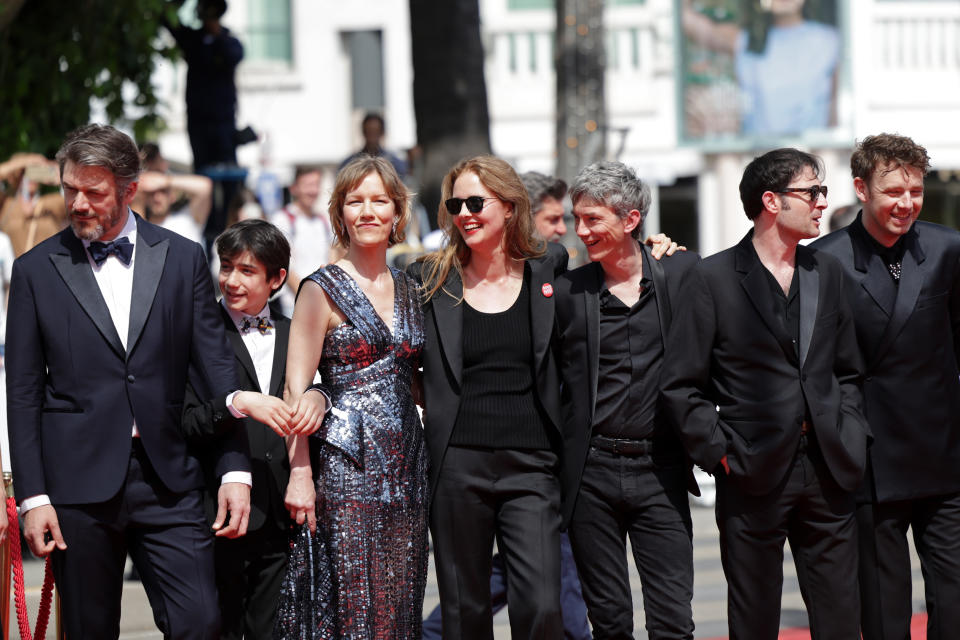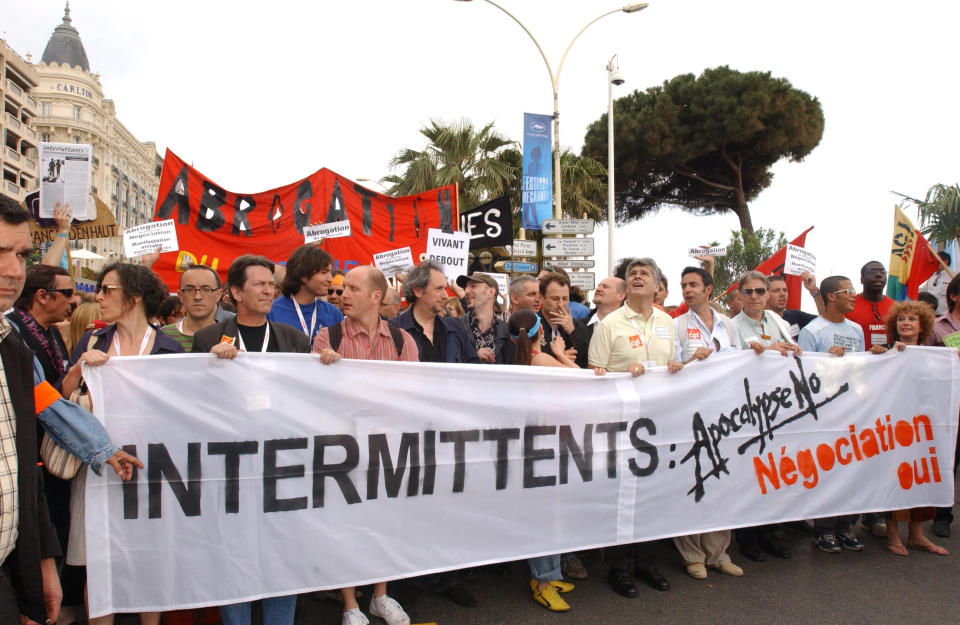Les Misérables! Cannes Film Festival Workers Planning Protests & Potential Strike Action Over Pay

EXCLUSIVE: The Cannes Film Festival is well known as a place of protest and this year will be no different. However, this edition, the rebellion is coming from within.
We can reveal that up to 200 French film festival workers — a combination of Cannes workers and workers from other festivals across France — are planning protests during the event over pay.
More from Deadline
Cannes Classics To Screen Tsui Hark's 'Shanghai Blues' Restoration
Paul Schrader's Cannes Competition Film 'Oh, Canada' Sets French Distribution With ARP Selection
The protests are being led by the group known as Sous Les Écrans La Dèche: Collectif Des Précaires Des Festivals De Cinéma (which translates to Under The Screens, The Waste: The Collective of Precarious Workers at Film Festivals). The name is a reference to the famous slogan of the May ‘68 protests: “Sous les pavés, la plage” (Under paving stones, the beach).
The progressive union launched in March 2020 and features workers from across different Cannes sections, including those who work on the Official Selection, the festival’s Marché du Film and parallel sections of Directors’ Fortnight and Critics’ Week, as well as workers from the Bordeaux International Independent Film Festival, the Lumière Festival in Lyon, and the Entrevues International Film Festival in Belfort.
Sources from within the movement tell Deadline that they plan to make themselves heard at the opening ceremonies of Directors’ Fortnight, Critics’ Week, and ACID Cannes, and will also stage demonstrations on the Croisette throughout the 12-day event, which begins on May 14 and will include starry premieres for movies including Francis Ford Coppola’s Megalopolis and George Miller’s Furiosa: A Mad Max Saga.
The nature of the protests is currently under wraps but the group intends to meet on Thursday to finalize its strategy. Our sources have told us that multiple forms of action are on the table, including a “full labor strike” which would see dozens of workers at the festival downing tools entirely. The workers involved include programmers, projectionists, subtitlers, festival press officers and various admin and technical workers, most of whom are part-time. Were projectionists or press officers to down tools that would be a major problem for the smooth-running of the festival. Without the former, it’s uncertain whether the event could even take place.
The group’s frustrations are two-fold. They are first rallying against the pay packages they receive from their employers, which they say are inadequate and often do not account for arduous overtime hours frequently clocked due to the demands of their jobs.
“From our own investigations, we found that 80% of festival employees are earning less than 2000 Euros ($2100) per month while in contract, which is impossible to live on in Paris,” one source within the movement told us on condition of anonymity.
The second bone of contention is France’s unique unemployment insurance program for entertainment workers and technicians. Known as Intermittence de Spectacle, the scheme supports entertainment workers on short-term contracts with an unemployment benefit when they are between jobs or projects. To qualify, workers must be able to prove they have worked a certain amount of hours over the financial year. The payments are funded through taxes paid by employers. But due to quirks in the regulations, many workers at French film festivals are excluded from the unemployment benefit.
Instead, they are hired and handed flat short-term contracts. The collective is campaigning to now be included in the scheme citing the inherent seasonal nature of the work.
“Nobody had been questioning the conditions and salaries of festival workers and we had all just accepted the work because we loved movies even though our lives were so tough. Now, everyone is discussing how absurd it is to be paid the minimum when these festivals welcome stars from all over the world,” another source said.
The Sous les Écrans la Dèche movement has some high-profile supporters. French filmmaker Justine Triet wore the group’s bright red pin on her suit lapel as she walked the red carpet for Palme d’Or winner Anatomy Of A Fall at last year’s Cannes Film Festival. The group is hopeful that more industry will wear the pin at this year’s festival.

Just before last year’s Cannes Film Festival opening ceremony the collective published a manifesto in the left-leaning French newspaper Libération, which landed them a meeting with the French Culture Ministry in Cannes.
We’re told that government officials were unaware that the workers represented by collective was not covered by the intermittent program. A meeting with France’s National Cinema Centre (CNC) followed, but we’re told there has yet to be any concrete action. The collective has since staged protest speeches at festivals across France and hosted onstage symposiums at arts events to highlight their work.
“The festival heads are generally not against us and are concerned about this situation, but they are just turning around and saying they’re also in complicated financial situations and claim to have limited power,” one member told us. “After one year, we’re now in a situation where everyone knows we exist and our requests. We are now hoping we can come to an agreement with our employers.”
Sources within the collective told us they contacted the office of Cannes chief Thierry Frémaux and the parallel sections this week laying out their concerns and willingness to hold public demonstrations at this year’s festival. They are yet to receive a reply but said they have heard festival management is aware of the situation and have been in communication with each other about the issue.
We have reached out to the festival for comment.
Members of the collective who work within the festival told us they expect resistance from the public and privately-backed non-profit event due to its generally apolitical mandate. Members claimed to us they were privy to internal discussions earlier this year when festival management declined an offer from Argentinian union Cine Argentino Unido for it to stage a protest at the festival in support of Argentina’s embattled film industry.
However, sources within the collective told us they are generally “optimistic” that improvements will be made because the effects of their dispute have “immediate” consequences on the efficiency of film events like Cannes, which are integral to the French economy.
“Many festival heads have told us they have noticed over the last two years that it is now difficult to find good staffers because of pay. That’s why they’re concerned,” another source commented. “Cannes will continue to find it hard to hire people so next year it may be difficult for the festival to even run properly. Cannes is so important to the French economy. It’ll only be down to Cannes to push for change.”
Sources are hoping that Cannes can set a positive example and commit to better pay: “If there is anyone who can do something to effect change it’s the Cannes Film Festival,” a member of the group added. “It’s so huge and it’s also become more and more difficult to find people to work in festivals because they don’t get paid well.”
The Cannes Film Festival is well accustomed to demonstrations. 20 years ago Cannes was the stage for similar protests as industry took to the streets over proposed cuts to unemployment benefits (see image below). Last year hospitality workers staged a ‘pots and pans’ demonstration outside the Carlton, also over pay, and France’s main energy workers union threatened to cut power supplies to Cannes as part of ongoing protests against unpopular pension reforms. Public demonstrations were later banned during the festival by local officials citing safety concerns.
The red carpet is a regular venue for protests of one kind and another, from eye-catching political stunts to ‘heelgate’ which saw women going barefoot in protest at having to wear high-heels.
French festivals are often repositories for political statement. In 2003, two of France’s popular summer arts festivals, the Festival d’Avignon and the Festival d’Aix-en-Provence, were canceled after weeks of disruptions and protests by striking staff over proposed changes to unemployment benefits. France itself is of course a common backdrop for industrial action. Rarely does a Cannes go by without some form of strike impacting travel arrangements.
The global film festival scene has experienced a particularly turbulent 12 months due to funding cuts, political protests and the impact of global conflicts. The Berlin Film Festival was impacted earlier year by a wave of unrest from workers and various political issues. Expectations are that Cannes may also see political protests, potentially related to the ongoing Israel-Gaza conflict and Russia’s war in Ukraine.
Andreas Wiseman contributed to this report.

Best of Deadline
Step & Repeat Gallery: The Best Red Carpet & Party Photos Of 2024
Hollywood & Media Deaths In 2024: Photo Gallery & Obituaries
2024 Premiere Dates For New & Returning Series On Broadcast, Cable & Streaming
Sign up for Deadline's Newsletter. For the latest news, follow us on Facebook, Twitter, and Instagram.

